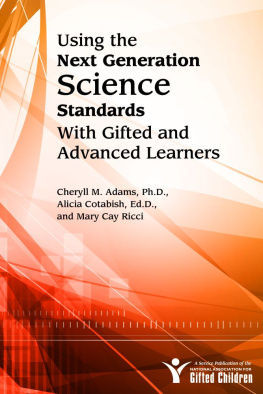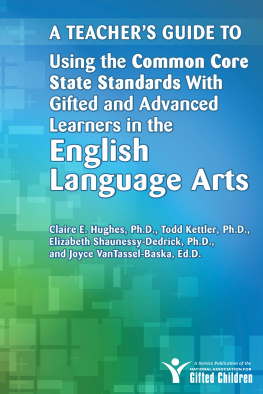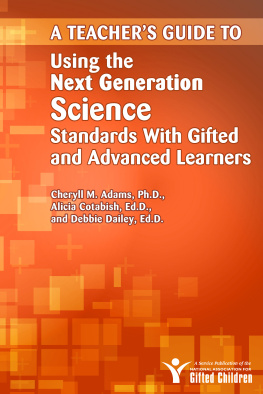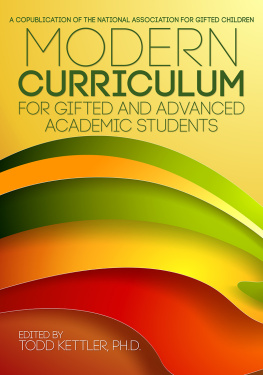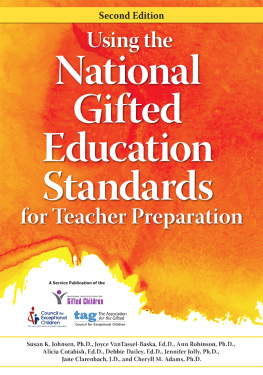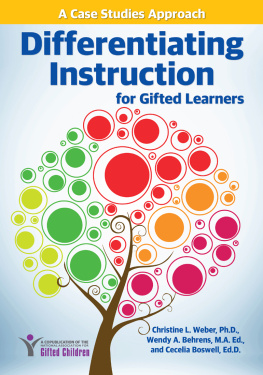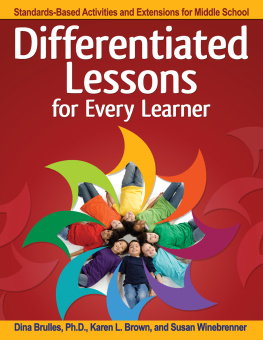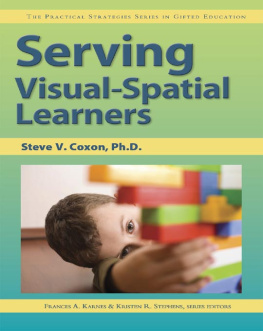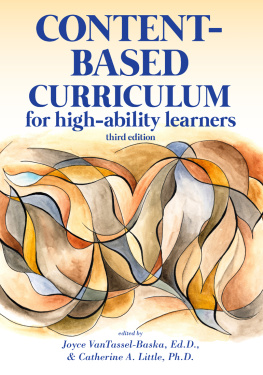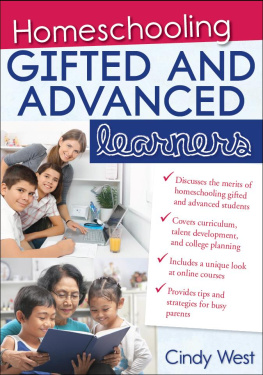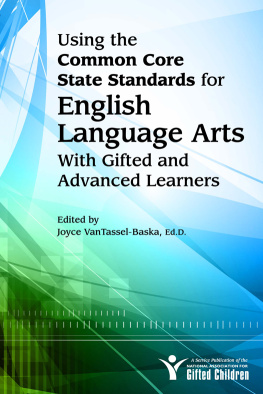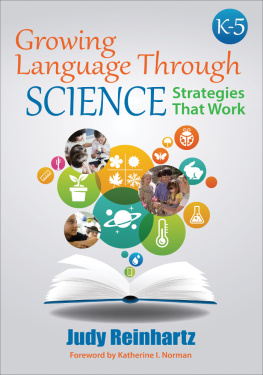About the Authors
Cheryll M. Adams, Ph.D., is the Director Emerita of the Center for Gifted Studies and Talent Development at Ball State University and teaches online graduate courses in gifted education and elementary education. She has authored or coauthored numerous publications in professional journals, as well as several books and book chapters. She has coauthored and directed three Jacob K. Javits grants. She serves on the editorial review boards for Roeper Review, Gifted Child Quarterly, Journal of Advanced Academics, and Journal for the Education of the Gifted. She has served on the Board of Directors of the National Association for Gifted Children and has been president of the Indiana Association for the Gifted and of The Association for the Gifted, Council for Exceptional Children.
Alicia Cotabish, Ed.D., is an assistant professor of teaching and learning at the University of Central Arkansas. Currently, Alicia teaches graduate-level K12 teacher candidates and secondary science methodology. Alicia directed STEM Starters, a Jacob K. Javits project, and was the former Associate Director of the Jodie Mahony Center for Gifted Education at the University of Arkansas at Little Rock. As a public school teacher, Alicia taught middle school and Pre-AP science, and was an award-winning gifted and talented teacher and coordinator for 8 years in Texas and Arkansas. Her recent work has focused on STEM, gifted education, and peer coaching.
Mary Cay Ricci is the Coordinator of Gifted Education in Baltimore County Public Schools in Maryland. She holds certification in gifted and talented education from Johns Hopkins University, where she is also a faculty associate in the Graduate School of Education Gifted Certification Program. Mary Cay has coauthored several articles for Parenting for High Potential. Her book, Mindsets in the Classroom: Building a Culture of Success and Student Achievement in Schools will be released in September 2013.
Acknowledgments
Many people have assisted with the efforts in developing this book. They include the leadership of NAGC, the NAGC Professional Standards Committee, reviewers, NAGC staff, and experts who were a part of the development of the other books in this series on using the Common Core State Standards with gifted and advanced learners.
We would like to thank Paula Olszewski-Kubilius, NAGC president, and the NAGC Board, who have understood the urgency for responding to the national standards movement, including the Next Generation Science Standards (NGSS) and the Common Core State Standards (CCSS), and the gifted education communitys need to have a voice in their implementation. From the beginning, the NAGC Professional Standards Committee also has been actively involved in providing the framework, expertise, and support for this book. Moreover, the NAGC leadership group also includes Nancy Green, Executive Director of the NAGC, and NAGC Association Editor Carolyn Callahan, who have supported the development process and the need for this book.
This book has also been strengthened through a rigorous review process. We want to thank these reviewers who took time to provide valuable advice and feedback:Debbie Dailey, Jeff Danielian, Jennifer Hoffman, Chrys Mursky, and Janice Robbins.
Finally, the authors want to express a special thank you to Jane Clarenbach, Director of Public Education at the NAGC office, who has provided the needed energy in supporting the authors through the process and a critical eye in editing the many drafts of this book. She has shepherded this writing project along with her many other duties with great diplomacy, tact, and endless amounts of patience.
Appendix A
Definitions of Key Terms
Acceleration is a broad term used to describe ways in which gifted student learning may occur at a fast and appropriate rate throughout the years of schooling. It refers to content acceleration through preassessment, compacting, and reorganizing curriculum by unit or year, grade skipping, telescoping 2 years into one, dual enrollment in high school and college or university, as well as more personalized approaches such as tutorials, mentorships, and independent research that also would be sensitive to the advanced starting level of these learners for instruction. Both Advanced Placement (AP) and International Baccalaureate (IB) at the high school level represent programs of study already accelerated in content. AP courses also may be taken on a fast-track schedule earlier as appropriate.
Appropriate pacing refers to the rate at which material is taught to advanced learners. Because they are often capable of mastering new material more rapidly than typical learners, appropriate pacing would involve careful preassessment to determine readiness for more advanced material to ensure that advanced learners are not bored with the material and are being adequately challenged. Note that although students might advance quickly through some material, they should also be given time to delve more deeply into topics of interest at appropriate advanced levels of complexity and innovation.
Assessment is the way to determine the scope and degree of learning that has been mastered by the student. For purposes of gifted education, the assessments must be matched to differentiated outcomes, requiring the use of authentic approaches like performance-based and portfolio-based assessment demands. Some assessments are already constructed and available for use, exhibiting strong technical adequacy and employed in research studies, although others may be teacher-developed, with opportunities to establish interrater reliability among teachers who may be using them in schools. Care should be taken to use assessments that do not restrict the level of proficiency that students can demonstrate, such as above-grade-level assessments that allow for innovative and more complex responses.
Characteristics and needs of gifted learners is the basis for differentiating any curriculum area. Scientifically talented learners often have strong spatial skills, see relationships, recognize patterns, make generalizations, and may be highly fluent, flexible, and original at problem finding and scientific inquiry at an earlier stage of development than typical learners. Because of this advanced readiness, these students may need to be accelerated through the basic material in science in order to focus on higher level science concepts and problems.
Complexity refers to a feature of differentiation that provides advanced learners more variables to study, asks them to use multiple resources to solve a problem, or requires them to use multiple higher order skills simultaneously. The degree of complexity may depend on the developmental level of the learner, the nature of the learning task, and the readiness to take on the level of challenge required.
Creativity and innovation are used to suggest that activities used with the gifted employ opportunities for more open-ended project work that mirrors real-world professional work in solving problems in the disciplines. The terms also suggest that advanced learners are proficient in the skills and habits of mind associated with being a creator or innovator in a chosen field of endeavor. Thus, creative thinking and problem-solving skills would be emphasized.
Curriculum is a set of planned learning experiences, delineated from a framework of expectations at the goal or outcome level that represents important knowledge, skills, and concepts to be learned. Differentiated curriculum units of study already have been designed and tested for effectiveness in science, or units may be developed by teachers to use in gifted instruction.
Differentiation of curriculum for gifted learners is the process of adapting and modifying curriculum structures to address these characteristics and needs more optimally. Thus, curriculum goals, outcomes, and activities may be tailored for gifted learners to accommodate their needs. Typically, this process involves the use of the strategies of acceleration, complexity, depth, and creativity in combination.
Next page
